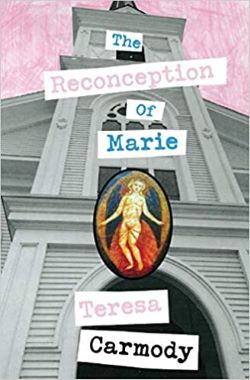Teresa Carmody Is a Damn Bandit


Teresa Carmody’s writing includes fiction, creative nonfiction, inter-arts collaborations, and hybrid forms. She is the author of three books and four chapbooks, including Maison Femme: a fiction (2015) and The Reconception of Marie (2020). Her work has appeared in The Collagist, LitHub, WHR, Two Serious Ladies, Diagram, St. Petersburg Review, Faultline, and was selected for the &NOW Awards: The Best Innovative Writing and by Entropy for its Best Online Articles and Essays list of 2019. Carmody is co-founding editor of Les Figues Press, an imprint of LARB Books in Los Angeles, and director of Stetson University’s MFA of the Americas.
1. What is the best thing that has been said/written about your writing?
Ok, so I have some resistance to ‘bests’ and ‘worsts,’ as I do ‘favorites’—everything’s so contextual, this living life, and maybe I prefer a particular shade of blue for my blouses, but would never paint my kitchen that color. That said, I have found myself, more than once and often while in my not-blue kitchen, thinking about something John Keene said in his blurb of The Reconception of Marie—that it provides “portraits of characters and a world still little seen in American literature but, in her hands and vision, not soon forgotten.”
I’m deeply honored that John Keene engaged with my book—he’s such an amazing writer and thinker—and it’s the “little seen” part of his comment that intrigues me. How does visibility (the other side of ‘little seen’) connect to legibility, connect to issues of accessibility and publishing? Reconception does portray a red-side of the country, Michigan’s Bible belt where white Christian equals Republican, and anything not “of God” is secular, i.e., evil. And while Marie leaves this world, it’s true, I wanted to tell her story on her terms–both literally and figuratively. This meant being inside her language, and risking misinterpretation. But that’s writing, yes?
2. What is the worst thing that has been said/written about your writing?
I once had a story rejected for being “mean.” Which is such a gendered critique—can you imagine anyone describing a male’s writing that way? The story was about two women falling into friendship, which is another kind of love. And that’s certainly the spirit with which I wrote. I’m reminded of that Muriel Rukeyser quote: “What would happen if one woman told the truth about her life? The world would split open.” And maybe call her “mean.”
3. What is the best writing advice you’ve been given?
To read a lot and broadly, especially outside your comfort zone and into the books and writers you want to be in conversation with. There are so many ways to write a story, a sentence, a character, so many ways to turn a phrase or create suspense, tension, movement. And you don’t have to read from beginning to end, either, but can enter a text at any point and read in any direction. Here, I point to Alice Munro’s short piece, “How I Write Short Stories,” where she compares a story to a house, writing: “Everybody knows what a house does, how it encloses space and makes connections between one enclosed space and another and presents what is outside in a new way.” I love this description, how you can hang out in any section of a text, noticing how it’s made, what it feels like, how it looks out to the world.
4. What is the worst writing advice you’ve been given?
I keep going back and forth here between “make it consistent” and “make it new.” I understand the value and context of both statements, but I find consistency boring and I think if you’re writing at the edge of what you think is possible, it will be better than new.
5. Who writes like a Damn Bandit?
There are so many, but to name a few who are living and have recently published books: Fernanda Melchor (translated by Sophie Hughes), Yuri Herrera (translated by Lisa Dillman), Paul Lisicky, Katherine Agyemaa Agard, Amanda Yates Garcia, Sarah Gerard, Sawako Nakayasu… oh! and Ugly Duckling Presse’s 2020 pamphlet series, with works by Aditi Machado, Magdalena Zurawski, and Don Mee Choi.